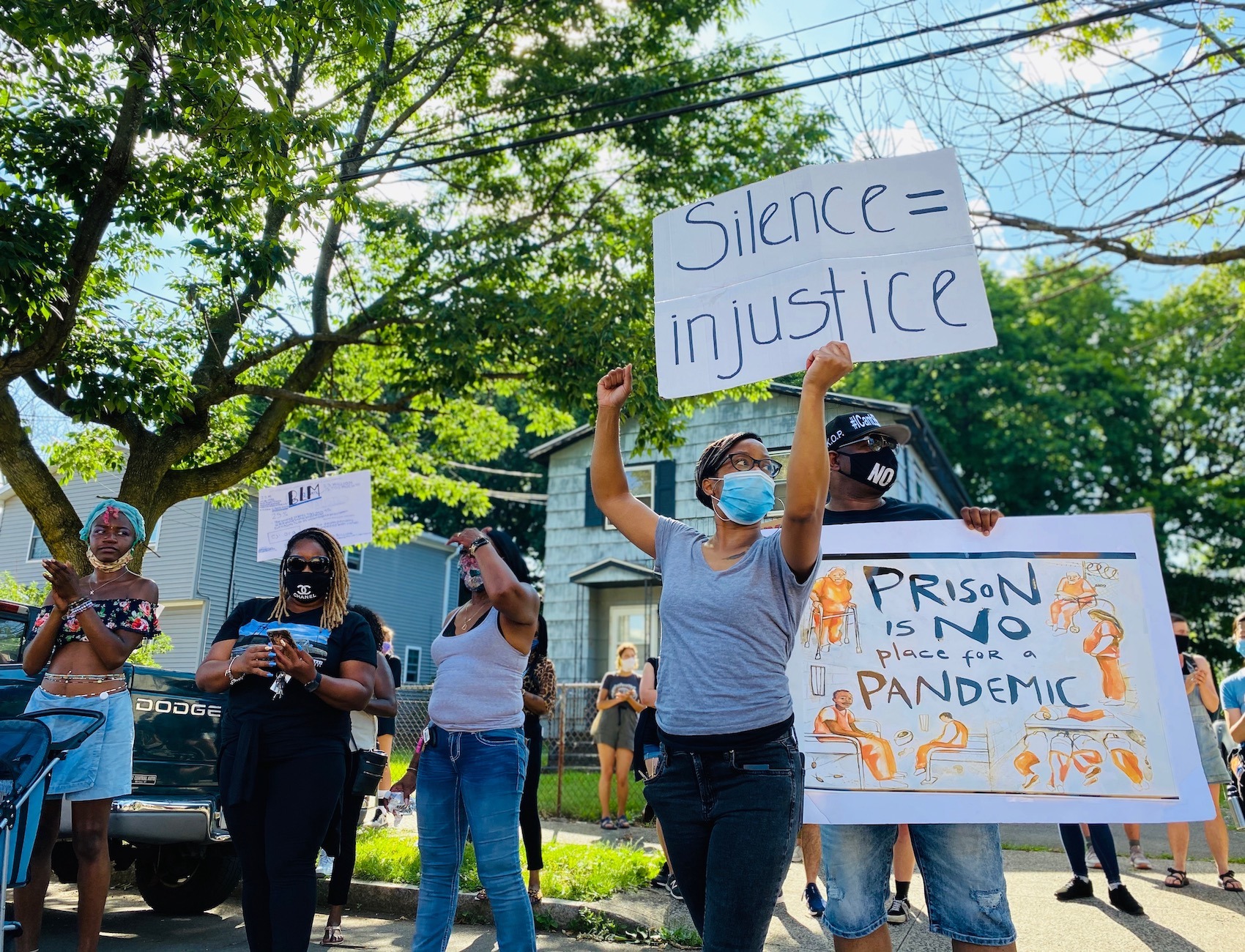Prisons Are the Public Health Crisis Connecticut Won’t Acknowledge
According to people incarcerated and their loved ones, state officials are ignoring the spread of COVID-19 at New Haven Correctional Center.

This piece is a commentary, part of The Appeal’s collection of opinion and analysis.
In June, the state of Connecticut agreed to settle a lawsuit brought by the American Civil Liberties Union to win release for thousands of incarcerated people as COVID-19 spreads through prisons and jails.
But the deeply inadequate settlement stipulates that only basic protections like soap, showers, masks, and quarantine measures be enacted, while diverting responsibility for release back to the Department of Correction and state courts that largely remain closed.
According to Governor Ned Lamont, these crude terms affirm “the approach that the Department of Correction has been taking since the beginning of this pandemic.” As volunteers for the Connecticut Bail Fund’s prison support hotline, we have been on the phone with people inside DOC facilities since March, and the conditions they describe make plain the violence of this “approach.”
We have received over 1,000 calls and over 300 letters from people incarcerated across the state, many from New Haven Correctional Center—a notoriously cruel jail and Level 4 security prison where, in March 2019, corrections officers killed 30-year-old Robby Talbot, pepper-spraying him and leaving him alone in restraints for two hours. Those inside testify to a DOC response that is at best systematic negligence and at worst state-sanctioned murder. In either case, the result is the same: As prisons and jails continue to be the nation’s largest COVID-19 hotspots, the disproportionately Black, brown, and poor people inside now face potential death sentences.
According to callers, who include those incarcerated and their loved ones, NHCC has been on lockdown since April, when correctional officers tested positive for the coronavirus that causes COVID-19. (People incarcerated first reported COVID-19 symptoms to us in March.) Callers tell us that staff have refused to clean cells or distribute sanitation supplies, forcing people to spend over 23 hours a day in cramped quarters with toilets that leak sewage and vents that blow hot, dirty air. Callers say they receive one hotel-size soap bar to split between cellmates every two weeks and masks so flimsy that one person wraps a T-shirt around his face instead. In the last few weeks, three people told us the drinking and shower water is brown: One person says he has contracted an infection from the dirty water.
From callers’ accounts, NHCC’s standards for medical evaluation are dangerously inadequate. We hear that, for months, “getting tested” meant getting temperature checks and nothing more. Callers tell us that the DOC did not administer a facility-wide swab test until June—one month after the DOC announced it would begin mass testing and two months after Carlos DeLeon, a 63-year-old who had been cleared for release, died of COVID-19 in DOC custody.
Medical requests are often ignored, callers say: One person was sent to work in the kitchen after telling staff he couldn’t taste or smell; another person was denied access to his inhaler; and another did not receive treatment until he coughed up blood.
In response to a request for comment, DOC denied the most horrific instances of neglect and abuse that people have spoken out about on our hotline. “Allegations that [incarcerated people] were denied medical attention and not seen until they were vomiting blood or that people were left in areas with sewage back-up” are false, they claimed. In place of evidence, they offered vague assurance that they are “taking measures to best protect…the incarcerated population.”
Their measures are vile. When people incarcerated in NHCC and across the state tested positive, some were transferred into solitary confinement—a form of torture—at the state’s only super-maximum security prison, Northern Correctional Institution. One caller told us, “If you get sick and you go to Northern, you’re gonna end up dying.”
For people who survive Northern and return to NHCC, the battle is far from over. We are fighting for the release of someone who has been held at NHCC on a $150,000 bond since November, contracted COVID-19, and spent two weeks at Northern. On top of being denied treatment for his symptoms, he hasn’t received a new court date since January, and his public defender has taken half a year to respond to his voicemails—a slow bureaucratic violence that so many people we talk to face. This person’s mother, his powerful advocate, describes the toll of waiting month after month for a court date that never comes and being placed on hold daily by the public defender’s office. “It’s the waiting, the not knowing, the disappointment,” she says. “My son has been sitting at Whalley [NHCC] almost nine months, uncertain of his fate. This is so disturbing, unfair, and unacceptable. The system has got to do better.”
We agree. Our community members on the inside deserve better than ongoing DOC brutality. Better than courts that keep people in legal limbo. Better than the settlement terms, to which hundreds of plaintiffs object. The Connecticut Bail Fund is calling on the state to immediately release half of its incarcerated population. We know that the pandemic has only intensified the violence of incarceration, and that mass release is a first step on the road to abolition. To guarantee the health and safety of everyone, everyone must be freed.
Eae Benioff, Micah Khater, Josh van Biema, and Nika Zarazvand are volunteers for the Connecticut Bail Fund prison support hotline.
